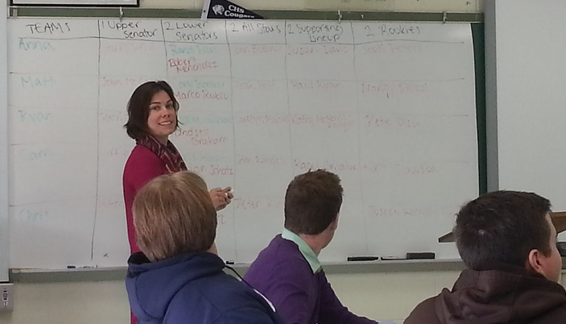 The College Board curriculum of AP Government and Politics includes "both the study of general concepts used to interpret U.S. Government and politics and the analysis of specific examples". By requiring "familiarity with the various institutions, groups, beliefs and ideas that constitute U.S. Government and politics", the College Board asks much of students and teachers.
The College Board curriculum of AP Government and Politics includes "both the study of general concepts used to interpret U.S. Government and politics and the analysis of specific examples". By requiring "familiarity with the various institutions, groups, beliefs and ideas that constitute U.S. Government and politics", the College Board asks much of students and teachers.
While studying the structure and operation of government, students in Ms. Walter's AP Gov classes also analyze the "real world" of politics today. Each class has it's own online current events discussion thread in Schoology, Chatham High School's new learning management system. Students take turns every week selecting news topics for analysis and comment, posting a summary of a news article, then framing questions for the class to consider, applying the conceptual understandings they are learning in the course to the real world in real time. The discussion threads are filled with hundreds of posts regarding everything from net neutrality, health care and Supreme Court decisions affecting gun control and abortion.
Recently, Ms. Walters had student begin a "Fantasy Congress" project that required students to follow a "team" of Representatives and Senators in the House and Senate, tracking their activity in Congress, earning points for the bills they sponsored, the bills they voted for and against and their committee work. Capitalizing on the same type of excitement sparked by fantasy football leagues, Mr. Walters had students start the project with a draft, using any criteria they'd like to select a Congressional "team" with "upper" and "lower" senators based on seniority, and a supporting line-up with "all-stars" and "rookies". While compiling their teams through the draft and weighing such things as party and state affiliation, gender, age and personality, students will have to decide who to put in the line-up and who to bench as the game goes on. Fantasy Congress allows students to immerse themselves in the minutiae of operation of the legislative branch of government as they watch who votes and who doesn't, who gets their bills out of committee and who can get bills through both houses of Congress. Each of these actions can earn or lose for points. But they also have to watch closely, as press statements, interviews or scandals can make or break their team.
In late April and early May, when Ms. Walters' students start to prepare in earnest for the College Board's AP exam in U.S. Government and Politics, they will have an intimate knowledge of how Congress works and they will have learned that information playing a game.
In late April and early May, when Ms. Walters' students start to prepare in earnest for the College Board's AP exam in U.S. Government and Politics, they will have an intimate knowledge of how Congress works and they will have learned that information playing a game.
.jpg)